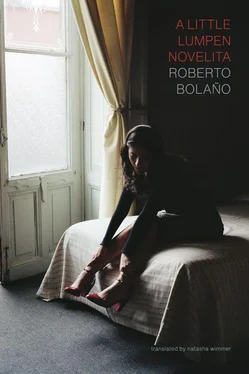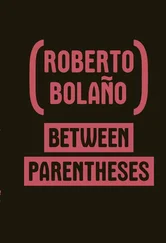And the closeness of my brother’s friends, a closeness built on the basis of glances and small gestures, among other things, wasn’t just flattering; I liked it, too. Let me explain: I was no one’s slave; I was the arbiter of them all. I was blind, but I was the yardstick by which they measured their freedom. It sounds stupid, but that’s how it felt and I’m sure they intended it that way. They didn’t swear in front of me, they weren’t like my brother, they took out the garbage, they always raised the toilet seat, unlike even my late father, a silent and considerate man.
But I don’t want to talk about my father. I want to talk about my brother’s friends and about the evening or night when I went through the drawers to see whether they had taken anything when they left. My brother saw me, I remember, and said with uncharacteristic certainty: “They didn’t take anything. They’re legal. They’re my friends.” But I still inspected the whole house, room by room, even searching the bathroom to see whether anything was gone, a bottle of cologne. Nothing. My brother was right.
Then a week went by and then another and my brother hardly mentioned his friends.
One night, as we were watching TV, he said that they were in Milan at a bodybuilding competition. Mr. Italy. I laughed.
“In Frosinone, maybe,” I said.
My brother looked at me, confused. What was I trying to say? That they might be able to make it in Frosinone, but not Milan? Maybe. I could imagine them anywhere else in Italy — Cosenza or Catanzaro, say — but not in Milan.
After that my brother stopped telling me things about them. I was someone — I realize now — who liked to face things head on, whereas my brother and his friends wandered real and imaginary places with their heads down. But facing things head on meant being consumed. I was being consumed.
I worked, did the shopping, cooked, watched TV, went with my brother to rent videos. Some nights I looked out the window and the night was as bright as day. Sometimes I thought that I was losing my mind, that it couldn’t be normal, such brightness, but deep down I knew I would never lose my mind.
I was waiting for something. A catastrophe. A visit from the police or the social worker. The approach of a meteorite, darkening the sky. My brother rented Tonya Waters movies and I washed heads and nothing happened.
One day they came back.
My brother didn’t mention it, maybe he didn’t know they were coming back either. They were there one night when I got home from work. The three of them were sitting on the couch watching TV. I looked them straight in the face and asked how things had gone in Milan. The Libyan got up and shook my hand. The Bolognan nodded irritably and didn’t get up from the couch. I could tell by their expressions that things hadn’t gone well. So I didn’t ask again. We ate together. We watched TV together. That night, while I was in bed thinking about them (or to be precise, thinking about their battered faces, shiny as if they’d been washed by force, as if a dark hand had dashed a bucket of water at them and then scoured them mercilessly, faces as wet and tired as if they’d returned from Frosinone on foot or in chains), while I was in bed, as I was saying, with the lights out and my eyes open, sure I would never fall asleep, one of them came into the room and made love to me. I think it was the Bolognan.
Then I asked again:
“How was Milan?”
And he said, “Bad, it was bad,” as he put something on his penis and penetrated me. I think it was a condom but I can’t say for sure.
The next morning, before I went to work, I looked for the used condom and couldn’t find it. So maybe it was a condom that he put on and maybe it was something else. But what? I’ll never know and now I don’t care, but back then, that morning, as I was getting dressed and making the bed, I thought about that and about danger and love and all the seemingly strange things that turn up when you least expect them and that are actually pretexts for something different, something else (attainable things, not unattainable things), and then I went to work, the others were sleeping, my brother in his room, his two friends in my parents’ old room, and the streets I walked didn’t look like yesterday’s streets, though I knew they were the same, streets don’t change overnight, maybe in some places they do, but I’ve never been to those places, maybe in Africa, but not here, here I was the one who was changing, but when I got to the salon I realized that I hadn’t changed, that the streets had shifted slightly, to the left or to the right, up or down, but I was still the same.
In my defense I can say — if anything needs to be said, if the notion of defense is pertinent (which it isn’t) — that at no moment did I think that I was falling in love. I saw the shadowy negative of romantic situations. I saw the negative of passionate moments whose point of reference was always a TV series or the whispering of girls now forgotten. Sometimes I saw the negative of a whole life: a bigger house, a different neighborhood, children, a better job, time passing, old age, a grandchild, death in the public hospital or covered with a sheet in my parents’ bed, a bed that I would have liked to hear creak, like an ocean liner as it goes down, but that instead was silent as a tomb.
That night I made love again with one of my brother’s friends and the next night and the night after that too, and every night that week and the week after, until it began to show on my face that I was making love every night or that I wasn’t sleeping much, to the point that my friends at work asked what was wrong, whether I was sick or what.
Then I looked in the mirror and I saw that I had circles under my eyes, that my face was pale, as if the moon, which shone as brightly for me as the sun, was affecting me. And then I decided that I didn’t need to make love every night and I locked my door.
Life, despite what I expected, continued unchanged.
What did I expect? Back then I must not have been completely sane, because I expected tears.
That was what I expected. But there wasn’t a single tear. They knocked at my door, many times, night after night, but neither of them cried.
Sometimes, as I was washing hair or sweeping the hallway at the salon, I imagined them waiting for me at home, patient in a way that was not of this world or at least not of the world that I knew, doing nothing but watching TV while my brother and I worked and brought home food and paid the bills that had to be paid. I imagined them sitting silently on the couch or I saw them doing push-ups and all those exercises they did to keep in shape, on the rug or by the balcony that overlooked Piazza Sonnino, as the day slowly faded and the light of the moon grew more intense, until it flooded night’s farthest corners with a blinding light.
They’ll never leave, I thought then.
Other times I thought: they’ll leave without telling us, one day we’ll come home and they’ll be gone.
But when I got home they were always there, the house spotless, because they made it their job to cheerfully do everything that I used to do. Cheerfully, I say, and gladly, though I knew perfectly well that it was a fake cheer, as fake as mine, that their apparent good will hid feelings of emptiness, of sadness and grief in the face of the void. But they worked around the house. Dinner was always ready, the bathroom scoured with bleach, the rooms tidy. As if with these gestures they were saying to me: we aren’t shiftless, we seem shiftless but we aren’t, in fact if it was up to us we would do everything we could to make you happy.
Once a week, sometimes twice, I let them into my room. I didn’t need to say anything, I just had to be more talkative than usual or give them a meaningful look (or what at the time I imagined was a meaningful look) and they knew immediately that they could visit me that night and they would find the door open.
Читать дальше












